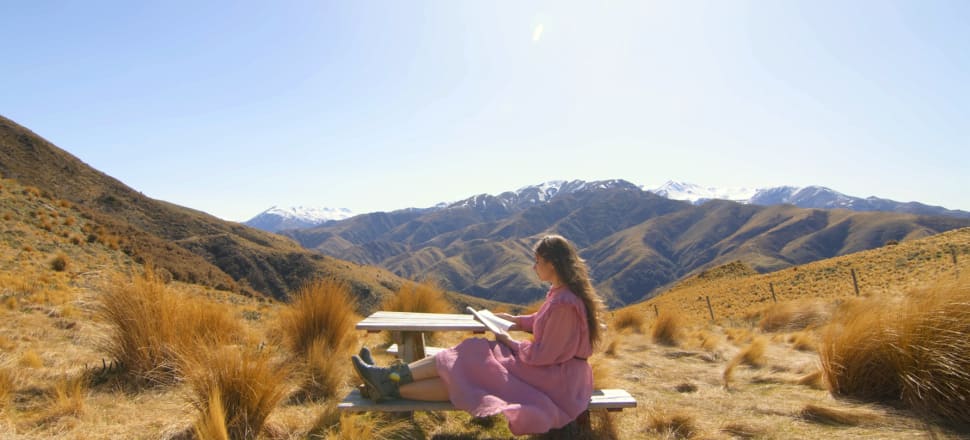
ReadingRoom literary editor Steve Braunias selects the year's best 10 or 11 collections of poetry
Rather a lot of New Zealand poetry in 2022 was concerned with identity politics, striking a set of bad-ass attitudes, and issuing various assorted manifestos outlining the author's moral and political righteousness, and as ever, Wellington was to blame for the worst of it, but none of this is necessarily a bad thing. Rather a lot of New Zealand poetry is passionate and proud, and there were many excellent collections in 2022, most of them, as ever, published by the university presses, even Auckland University Press, so often the dog in the manger, but which picked the year's freshest collection, Meat Lovers by Rebecca Hawkes.
Te Herenga Waka University Press remains the market leader. I hereby declare The Stupefying by Nick Ascroft as the best book of poetry of 2022 and also wish to add as an aside that I doubt this top 10 or 11 will bear much of a resemblance to the 2023 Ockham longlist; expect rather more bad-assery and identity political parades as chosen by the poetry industrial military Ockham complex. In the meantime, by all means consult this list in the days leading up to Xmas. Get thee to a bookstore.
The Stupefying by Nick Ascroft (Te Herenga Waka University Press, $25)
The very best book of poetry of 2022. Ascroft somehow seems to fly under the radar as a career poet and I suspect it's because he's really funny, which is always a bit suspect in the fields of serious literature. But all the jokes are asides. He's a serious craftsman, and The Stupefying operates in a quieter register than his earlier, more boisterous work.
The couples therapist lived in Highbury, down
a sudden little valley. We parked the car
near the top and toe-heeled the slope,
making jokes,
the way the walking dead do.
Meat Lovers by Rebecca Hawkes (Auckland University Press, $25)
Very nearly the best book of poetry of the year and certainly the most committed to its subjects: meat, farming, cruelty, hunger, bloodlust, and love.
The old station-holders used to castrate lambs
to wethers with their teeth – isn’t that your area
of interest? Hard men rousing on the muster
posing the evergreen question: to spit or swallow?
But think how tender those shepherds must have been
with their incisive surgery – the cutting kiss –
and all that bleating.
Sheep Truck and other poems by Peter Olds (Cold Hub Press, $20)
Peter Olds is unwell. He was unable to attend the launch of his latest and last collection. It's the final act of one of the great literary bohemians, a gentle, wandering soul who walked all of the streets of Dunedin.
All over the world poets of my age (or older)
are writing their last poems; some know it,
some don’t. I might write another poem
after this, but this is my Last Poem
People Person by Joanna Cho (Te Herenga Waka University Press, $30)
Cho was the subject of the year's best literary profile, by Fergus Porteous, who wrote, "The book is remarkable in many ways, but perhaps most poignantly in its rendering of her relationship with her mother, who raised Joanna and her siblings by herself on the dole…Her mother’s story operates as a sort of foil through which Joanna appears to sublimate her own deep anxieties by transference." There are also love poems, if this is love:
I tried to be chill, for you and for me.
I tried to be chill,
but at the gig I scoped out the exit, just in case,
and you sculled your beer and turned
cos there was nothing left to say.
The next day we walked around town
and noticed the loop pedal at the busker’s feet.
We got hungry.
We got food.
I knew these would be our last fish and chips.
My American Chair by Elizabeth Smither (Auckland University Press, $25)
Death is one of the themes - Smither is 81 - in the New Plymouth poet's latest collection; there is a stillness going on in these beautifully crafted poems, things looked at from a distance, seen as memories.
When you purchase them you must allow –
five stems, fifteen buds, only two half-
open – for their circumference to come
flouncing, bowing, bending in two days’ time
like fifteen girls who have changed into
white debutante dresses or five women
who have danced all night and come home with the milkman.
Sedition by Anahera Gildea (Taraheke / Bushlawyer, $30)
From the publisher: "The work ranges and rages through generations, taking in a mother's anguish and a daughter's hunger for justice. Born of lava, this poetry responds to and resists the commodification of culture and whenua, and the perversity of everyday acts of neocolonisation."
My neighbour is learning te reo. Man he's proud.
His long body of white
flicking hair, conquering language.
HEAL! by Simone Kaho (Saufo`i Press, $30)
The year's best, most passionate response to a collection of poems was by Kahu Tumai in Pantograph Punch, who addressed the book's theme: "Indigenous women subjugated to violent men," as Tumai wrote. "Kaho’s writing conveys the frantic uneasiness of panic attacks and addiction, while carefully encapsulating the fraught navigations of being a woman (with Polynesian ancestry) in relation to patriarchy and toxic masculinity. Her honest, messy and unrelenting words dive deep into the disarray of trauma."
When the man in the poetry pub tightened his
grip on my hand after shaking it
I planted a glass in his head.
In some alternate reality.
…
It’s beautiful how ready I was
to hold his
eyeball in my fist.
The Tip Shop by James Brown (Te Herenga Waka University Press, $25)
Like Nick Ascroft, Brown is almost kind of cursed with being funny – I have one of his earlier works, published by Braunias University Press – but he's also a poet of great care who travels with a light step. The ever astute critic Harry Ricketts reviewed The Tip Shop on RNZ. "He's often very funny," he said, and you just knew that he would come up with a but. "But," he added, "the James Brown world is a world of rescues that go wrong, encounters that flare and fizzle, and taking a bath is seen as being in a small boat taking on water...These poems wonderfully evoke life as muddle and complication."
We admired a row of
renovated colonial houses.
‘You know who lives in them?’
said my friend. ‘Policy analysts.’
Another Beautiful Day Indoors by Erik Kennedy (Te Herenga Waka University Press, $25)
"Erik", wrote prolific Newsroom contributor Bruce Rogan in the comments section beneath Kennedy's poem about the phosphate trade, "because of surgery I now don't make enough testosterone to be able to read your poem and your account without bursting into tears."
You can see the phosphate dust from space,
like a tantrum in a sandbox.
You don’t have to look hard for motives
when someone guards their shame with barrenness and explosives.
Night School by Michael Steven (Otago University Press, $25)
I thoroughly and unreservedly dig this guy's work, a lot; there are times when I think of him as my favourite male New Zealand poet, and I certainly regard him as New Zealand's best poet of the working class.
It’s a clear night. Hamish and Wiremu
crack stubbies of Waikato Draught.
Burn what’s left from the outdoor season.
Words between them are slow in coming.
When they do come, they are spare and pointed.
Tomorrow they will load rams on the Isuzu
into a holding pen made from old pallets,
for a man in Weymouth to fatten for Ramadan.
Everyone is Everyone Except You by Jordan Hamel (Dead Bird Books, $30)
"I know it’s an extremely un-New Zealand thing to say, but I think my book is quite good", claimed the author in a charming self-portrait in ReadingRoom. The poems are actually very self-effacing, also witty and gentle, as he wonders about manhood and millenniality in Aotearoa.
Poetry is the infinity pool of vanity
and baby I have brought my wetsuit ReadingRoom is devoting all week to the best books of the year. Monday: the best nonfiction. Tuesday: the best illustrated books.Tomorrow: the best fiction.







